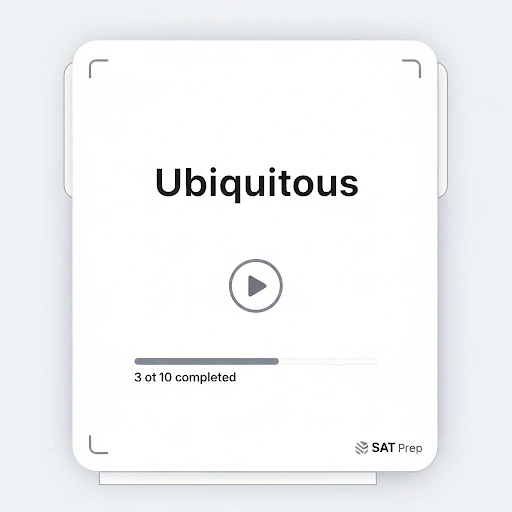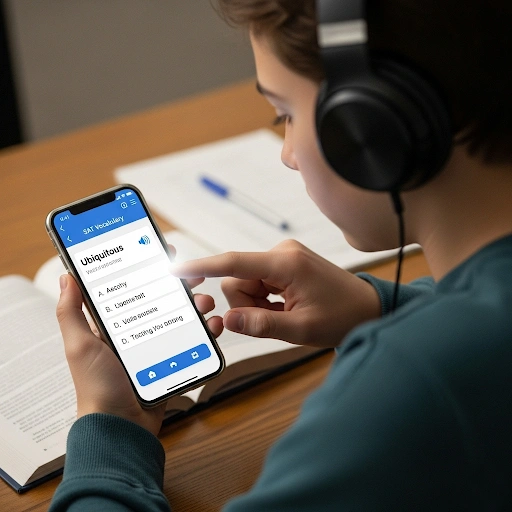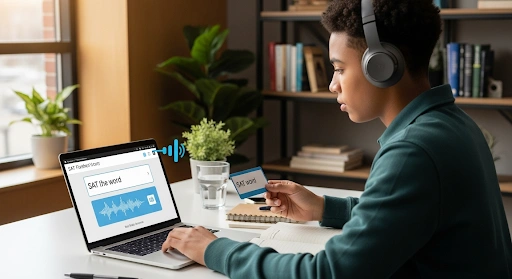Mastering the SAT vocabulary section can feel overwhelming, but SAT vocab audio flashcards make it manageable. Many words are unfamiliar, and rote memorization often fails, yet using SAT vocab audio tools helps reinforce comprehension and memory. By practicing pronunciation and active recall with SAT vocab audio, you turn a daunting task into an effective, engaging learning experience. This guide shows how to leverage SAT vocab audio for better retention and confidently tackle the SAT vocabulary demands in 2025.
SAT vocabulary flashcards are essential tools to help students master high-frequency SAT words, and using SAT vocab audio enhances this process. One side of the card shows the word, while the other provides its meaning, synonyms, and an example sentence. Incorporating SAT vocab audio allows learners to hear correct pronunciation, boosting retention. By practicing regularly with SAT vocab audio, these flashcards become a highly effective way to strengthen both recognition and usage of challenging vocabulary.
Why Pronunciation Audio is Crucial for SAT Vocab Study in 2025:
- Multi-Sensory Learning: Learning involves more than just sight. Hearing a word’s pronunciation engages your auditory memory, creating a stronger neural connection and aiding recall.
- Correct Pronunciation: Mispronouncing a word can hinder your ability to recognize it in spoken context or even recall it correctly. Audio ensures you learn the correct way to say each word.
- Enhanced Recognition in Context: When you’ve heard a word correctly pronounced, you’re more likely to recognize it when reading aloud or hearing it in a lecture, which improves overall comprehension.
- Confidence in Usage: Knowing how to pronounce a word correctly builds confidence, making you more likely to use it in your own writing and speaking, which can subtly reinforce your understanding.
- Mimics Real-World Language: Language is both written and spoken. Integrating audio makes your vocabulary acquisition process more holistic and true to how language is used.
- Reduces Ambiguity: Some words are spelled similarly but pronounced differently with different meanings (e.g., “lead” vs. “lead”). Audio clarifies these distinctions.
In short, using SAT vocab audio flashcards turns what could be a dull memorization task into an engaging, multi-sensory learning experience. SAT vocab audio helps reinforce correct pronunciation and word usage, while practicing with SAT vocab audio regularly boosts retention and comprehension. By integrating SAT vocab audio into your study routine, you enhance overall language mastery and make vocabulary learning for the exam far more effective.

Why Learning SAT Vocab with Audio Matters for Exam Success
While direct “vocabulary sections” on the SAT have changed, a robust vocabulary, enhanced by pronunciation practice, remains a cornerstone for achieving a high score. Mastering SAT vocabulary flashcards with pronunciation audio offers critical advantages:
- Reading Comprehension: The SAT Reading section features challenging passages from various disciplines (literature, history, science). Encountering unfamiliar vocabulary can significantly slow you down or lead to misinterpretations. Knowing these words, and how they sound, allows for smoother, faster comprehension.
- Writing and Language Section Accuracy: This section often tests your ability to choose the most precise word in context. A deep understanding of nuance, which comes from holistic vocabulary acquisition, is vital. Pronunciation can sometimes help distinguish subtly different words.
- Context Clues Mastery: Even if you don’t know a word, a strong vocabulary foundation helps you deduce its meaning from context clues more effectively. Practice with audio helps internalize the “feel” of a word.
- Increased Reading Speed: The less often you stop to figure out a word, the faster you can read and absorb complex information, which is a major time-saver on a timed test.
- Improved Writing Fluency: As your vocabulary expands and you internalize correct usage and pronunciation, your own writing becomes more sophisticated and precise, which can benefit essay portions (if applicable) or general academic writing.
- Reduces Test Anxiety: Approaching the exam knowing you have a solid grasp of high-frequency SAT words, including how they sound and are used, significantly reduces anxiety and boosts confidence. For broader SAT preparation strategies, check out our guide on SAT Reading Strategies.
How It Works: Effectively Using SAT Vocabulary Flashcards with Audio
To truly maximize the benefits of SAT vocabulary flashcards with pronunciation audio, a systematic approach is key. Here’s how to learn SAT vocab with audio efficiently:
Phase 1: Setup & Selection (Building Your Deck)
Choose your flashcard platform and curate your word list wisely.
- Choose a Platform:
- **Dedicated Apps:** Anki, Quizlet, Magoosh SAT Prep (often include audio).
- **Websites:** Many SAT prep sites offer free flashcards with audio features.
- **DIY (with audio integration):** Create your own physical or digital flashcards and use an online dictionary (like Merriam-Webster or Oxford Learner’s Dictionaries) for pronunciation audio.
- Curate Your Word List:
- Focus on high-frequency SAT words (lists from College Board, reputable test prep companies).
- Prioritize words you encounter in SAT practice tests or challenging readings.
- Don’t try to learn thousands of words at once; break them into manageable sets (e.g., 20-30 words per week).
- Customize Your Cards:
- **Front:** Word, phonetic pronunciation, and audio button.
- **Back:** Definition(s), synonyms/antonyms, example sentence (especially one that clarifies usage), personal mnemonic/association.
Phase 2: Active Learning with Audio (Engaging Your Senses)
This is where the magic happens – consistent, active engagement with your flashcards.
- Pronounce Aloud with Audio:
- Each time you see a new word, listen to the audio pronunciation carefully.
- Repeat the word aloud several times, mimicking the audio. This creates muscle memory in your mouth and reinforces auditory learning.
- Say the word, then its definition, then the example sentence.
- Active Recall:
- When reviewing, look at the word, *try to recall* its definition and pronunciation *before* flipping the card or playing the audio.
- Say the definition aloud, then check your answer. This struggle strengthens memory.
- Contextual Practice:
- Always pay attention to the example sentences. How is the word used? What are its common collocations?
- Try to create your own original sentence using the word. This moves beyond passive recognition to active usage.
- Identify Synonyms & Antonyms:
- Group words with similar meanings. This helps with the “words in context” questions on the SAT.
- Understanding opposites can clarify definitions.

Phase 3: Spaced Repetition & Integration (Long-Term Retention)
The key to long-term vocabulary retention is strategic review and consistent application.
- Implement Spaced Repetition:
- Use apps like Anki or Quizlet that automatically schedule reviews based on your performance. You see words you struggle with more often.
- If using physical cards, create a system (e.g., “Daily,” “Every 3 Days,” “Weekly” piles) to review based on how well you know the word.
- Integrate into Reading:
- When reading SAT practice passages or academic articles, actively look for your target vocabulary words.
- Underline them and mentally (or physically) recall their meaning and pronunciation.
- Integrate into Writing:
- Consciously try to use your new vocabulary words in your essay writing, homework assignments, or even in casual conversation.
- Using them in your own context solidifies understanding and makes the words truly “yours.”
- Regular Quizzing:
- Periodically take vocabulary quizzes or sections from full-length SAT practice tests to gauge your progress.
- Don’t just rely on flashcard drills; test yourself in an exam-like setting.
Mastering “Ubiquitous” with Audio Flashcards
Let’s illustrate how a student, David, used SAT vocab audio flashcards to master a challenging word like “ubiquitous,” which he often struggled to remember and pronounce. By practicing with SAT vocab audio regularly, he reinforced correct pronunciation and comprehension. The consistent use of SAT vocab audio helped him recall the word more easily, and integrating SAT vocab audio into his study routine made learning new vocabulary more effective and engaging.
David menggunakan aplikasi kartu digital dengan fitur audio kosakata SAT. Alat audio kosakata SAT ini memungkinkannya mendengar pengucapan yang benar saat meninjau setiap kata. Dengan mengandalkan audio kosakata SAT secara teratur, ia memperkuat memori dan keterampilan berbicara. Mengintegrasikan audio kosakata SAT ke dalam sesi belajarnya membuat proses belajar menjadi lebih interaktif dan efektif.
The “Ubiquitous” Flashcard Process:
- Initial Encounter: David first encountered “ubiquitous” in an SAT practice reading passage about technology. He didn’t know the word, so he added it to his digital flashcard deck.
- Flashcard Creation & Audio Integration:
Ubiquitous[yoo-BIK-wih-tuhs]**Definition:** Present, appearing, or found everywhere.**Example:** “In 2025, smartphones have become truly ubiquitous, found in nearly every pocket and purse.”**Synonyms:** omnipresent, pervasive, worldwide.**Mnemonic:** “You pick a bus” – buses are everywhere. (David’s personal mnemonic)
He clicked the audio button repeatedly, pronouncing “ubiquitous” aloud multiple times until it felt natural. He also typed in his personal mnemonic.
- Active Recall & Spaced Repetition: The flashcard app presented “ubiquitous” to David initially after an hour, then the next day, then three days later. Each time, he would:
- Look at “Ubiquitous.”
- *Try to recall* definition and pronunciation.
- Say “Ubiquitous means ‘found everywhere,’ pronounced yoo-BIK-wih-tuhs.”
- Play the audio to confirm.
- Mentally (or verbally) try to use it in a sentence, often using his mnemonic for a quick mental trigger.
- Contextual Application: David started actively looking for “ubiquitous” in news articles, textbooks, and other SAT passages. When he found it, he’d pause, mentally recall its meaning and pronunciation, and appreciate its usage.
- Writing Integration: In a practice SAT essay, he consciously chose to use “ubiquitous” when discussing the prevalence of social media. The act of writing it out and using it correctly further cemented the word in his long-term memory.
Through this consistent, multi-sensory approach using SAT vocab audio flashcards, “ubiquitous” transformed from a frustrating unknown to a word David confidently used. By practicing with SAT vocab audio regularly, he reinforced both recognition and pronunciation. Integrating SAT vocab audio into his study routine demonstrated how effectively one can master words. This approach highlights the power of SAT vocab audio in making learning active and memorable.
Types of SAT Vocabulary Tools
When seeking to learn SAT vocab with audio, you’ll find various tools available. Here’s a comparison to help you choose the best fit for your study style, keeping the emphasis on SAT vocabulary flashcards with pronunciation audio:
| Tool Type | Description | Pros (Emphasis on Audio) | Cons |
|---|---|---|---|
| Dedicated Vocab Apps (e.g., Anki, Quizlet, Magoosh Vocab) | Mobile/web applications often with pre-made SAT decks, spaced repetition, and integrated audio. |
|
|
| Online Dictionaries with Audio | Websites (e.g., Merriam-Webster, Oxford) providing definitions, usage, and audio pronunciation. |
|
|
| Audiobooks / Podcasts (Academic) | Listening to academic or high-level spoken content. |
|
|
| Physical Flashcards (DIY) | Handwritten cards. Can be combined with a separate audio source. |
|
|
For comprehensive and efficient vocabulary learning, using a dedicated app with SAT vocab audio flashcards and pronunciation features, along with spaced repetition like Anki or Quizlet, delivers excellent results. Combining SAT vocab audio practice with strategic reading helps reinforce word recognition. Actively using SAT vocab audio in writing or speech further strengthens retention. This approach ensures that SAT vocab audio becomes an integral part of a successful study routine.
Common Mistakes to Avoid When Studying SAT Vocabulary with Audio
While using SAT vocab audio flashcards is highly effective, some common mistakes can slow your progress. Avoiding pitfalls ensures that your SAT vocab audio practice remains productive. Failing to engage actively with SAT vocab audio can reduce retention. Consistently applying SAT vocab audio strategies helps you truly master the words and pronunciation.
- Passive Listening/Viewing: Just looking at the word or passively listening to the audio without actively trying to recall the definition or pronounce it yourself. This is ineffective.
- Relying Solely on Definition: Not paying attention to example sentences, synonyms, or antonyms. This limits your understanding of the word’s nuances and contexts.
- Cramming Too Many Words: Trying to learn hundreds of words in a short period. This leads to superficial learning and rapid forgetting. Focus on smaller, consistent sets.
- Ignoring Pronunciation Audio: Skipping the audio playback, especially for words you think you know. This misses a vital multi-sensory learning opportunity and can lead to mispronunciations.
- Not Using Spaced Repetition: Reviewing all words every day, or only cramming right before a test. Spaced repetition ensures optimal long-term retention.
- Neglecting Contextual Practice: Learning words in isolation without seeing them used in sentences or reading passages. Words are best understood and remembered in context.
- Not Creating Personal Associations: Failing to link the word to something meaningful for you (a mnemonic, a personal story, an image). Personal connections make words stick.
- Giving Up Too Soon: Vocabulary acquisition is a continuous process. Don’t get discouraged if a word doesn’t stick immediately. Persistence and varied review are key.
- Focusing on “Obscure” Words: Prioritizing extremely rare or archaic words over high-frequency SAT vocabulary. Stick to reputable lists.
Expert Tips and Best Practices for SAT Vocabulary Mastery with Audio
To truly master your vocabulary and leverage SAT vocabulary flashcards with pronunciation audio to their fullest, integrate these expert strategies into your study routine:
- Make it a Daily Ritual: Consistency is paramount. Dedicate 15-20 minutes daily to vocabulary, ideally using a spaced repetition app. Short, regular bursts are far more effective than long, infrequent sessions.
- Read, Read, Read: The best way to build vocabulary is through extensive reading. Read challenging articles, classic literature, and science texts. When you encounter an unfamiliar word, add it to your flashcards and actively look for its pronunciation.
- Use New Words in Your Own Writing & Speech: Consciously try to incorporate new vocabulary words into your essays, homework, and even daily conversations. This active production forces deeper processing and solidifies meaning.
- Focus on Root Words, Prefixes, and Suffixes: Understanding common Latin and Greek roots, prefixes (e.g., *un-, re-, pre-*) and suffixes (e.g., *-tion, -ology, -able*) can help you deduce the meaning of unfamiliar words and expand your vocabulary exponentially.
- Create Visual Associations: For each word, try to form a vivid mental image that connects the word to its meaning. For example, for “gregarious,” imagine a huge, friendly crowd.
- Group Words by Theme or Nuance: Instead of just alphabetical order, sometimes grouping words with similar themes (e.g., words for “happy,” “sad,” “argumentative”) or subtle differences in meaning (e.g., “empathy,” “sympathy,” “compassion”) can enhance understanding and retention.
- Review the “Hard” Words More Often: Use the feedback from your spaced repetition system. Don’t just skip words you keep getting wrong; prioritize them for more frequent review.
- Listen to Academic Podcasts/Speeches: Actively listen to content that uses higher-level vocabulary. This reinforces pronunciation and helps you recognize words in auditory contexts.
- Practice with SAT-Style Questions: Regularly apply your growing vocabulary to actual SAT Reading and Writing & Language practice questions. This ensures you’re learning words in the context they’ll be tested.
- Stay Patient and Persistent: Vocabulary building is a marathon, not a sprint. Celebrate small victories and remember that every new word learned contributes to your overall language mastery and SAT success.

FAQ Section
Here are some frequently asked questions about utilizing SAT vocabulary flashcards with pronunciation audio and how to effectively learn SAT vocab with audio:
Q: How many SAT vocabulary words do I need to know?
A: While there’s no magic number, most reputable SAT vocab lists contain 500-1000 high-frequency words. Focus on mastering these commonly tested words and the strategies to deduce meaning from context, rather than aiming for an exhaustive list.
Q: Can I use physical flashcards for audio pronunciation?
A: Yes! For physical flashcards, you’ll need to manually look up the pronunciation for each word using an online dictionary or a dictionary app. Make sure to repeat the word aloud several times after listening to the audio to reinforce the correct pronunciation.
Q: How often should I review my SAT vocab flashcards?
A: Daily, for about 15-20 minutes. If you’re using a spaced repetition system (like Anki), it will automatically optimize your review schedule. Consistency is far more important than long, infrequent cramming sessions.
Q: What if I struggle to remember a word even with audio and context?
A: This is normal! Try creating a highly personal mnemonic (a silly story, an image that pops into your head, an acronym). Also, ensure you’re actively using the word in your own sentences and reading it in different contexts. Sometimes, moving on and coming back to it later also helps.
Q: Do I need to know every single definition for a word?
A: No, focus on the most common and relevant definitions for SAT contexts. The exam often tests common uses. If a word has multiple distinct meanings, make a note of the primary ones relevant to academic or standard English usage.
Q: Are there specific types of words I should prioritize for the SAT?
A: Yes. Focus on words that convey nuance, express abstract concepts (e.g., “ambivalent,” “ubiquitous”), describe human character or behavior (e.g., “benevolent,” “gregarious”), or are commonly found in academic prose across various subjects (history, science, literature).
Q: Can I use listening to audiobooks to build my SAT vocabulary?
A: Yes, this can be a great supplemental strategy! Listening to academic or classic literature audiobooks exposes you to higher-level vocabulary in context and helps with pronunciation. However, it’s a passive method; combine it with active flashcard review for best results.
Conclusion
Mastering SAT vocabulary is a key component of achieving a competitive score, and using SAT vocab audio flashcards is one of the most dynamic and effective ways to do it. By integrating SAT vocab audio tools into your daily study routine, you can engage multiple senses and strengthen retention. Consistent practice with SAT vocab audio, combined with spaced repetition and active usage of new words in context, transforms vocabulary acquisition from a daunting task into an engaging and highly productive journey. Understanding not just what a word means, but also how it sounds and is applied in context, deepens comprehension and builds lasting confidence.
Invest your time wisely by incorporating SAT vocab audio into your daily routine, as using SAT vocab audio consistently can significantly improve retention. Pair reading exercises with SAT vocab audio to hear words in context, and supplement practice tests with SAT vocab audio for a well-rounded preparation. Engaging with SAT vocab audio regularly makes mastering high-level vocabulary easier and more enjoyable, preparing you not only for the SAT but for future academic success.
Khan Academy’s official SAT program. You can also explore research-backed tips on effective study strategies from
Edutopia and insights on learning science from
ScienceDaily Education.
To expand your digital skills, especially in cloud security, consider the in-depth resources from the
Cloud Security Alliance (CSA), a leading authority on cloud best practices. For hands-on guides, explore our posts on building a
secure digital toolkit, helping you combine technical know-how with effective study habits.
